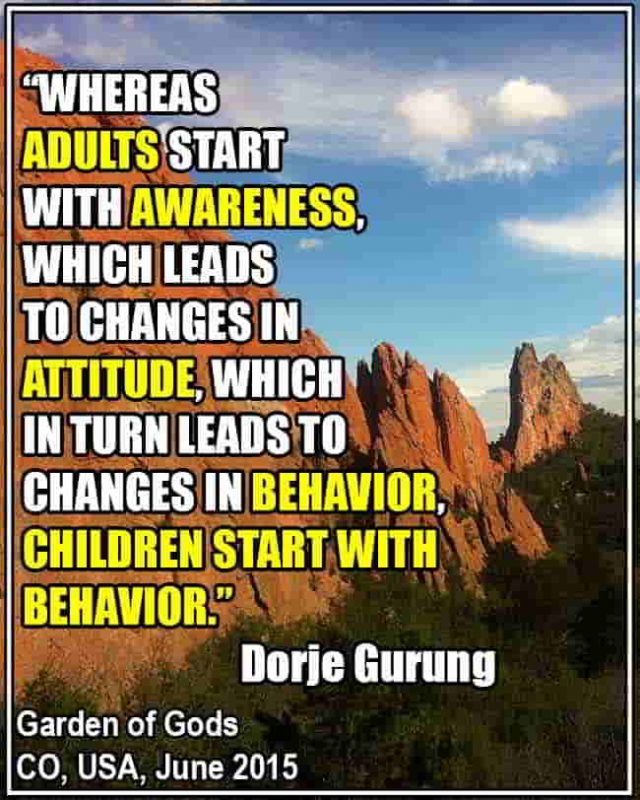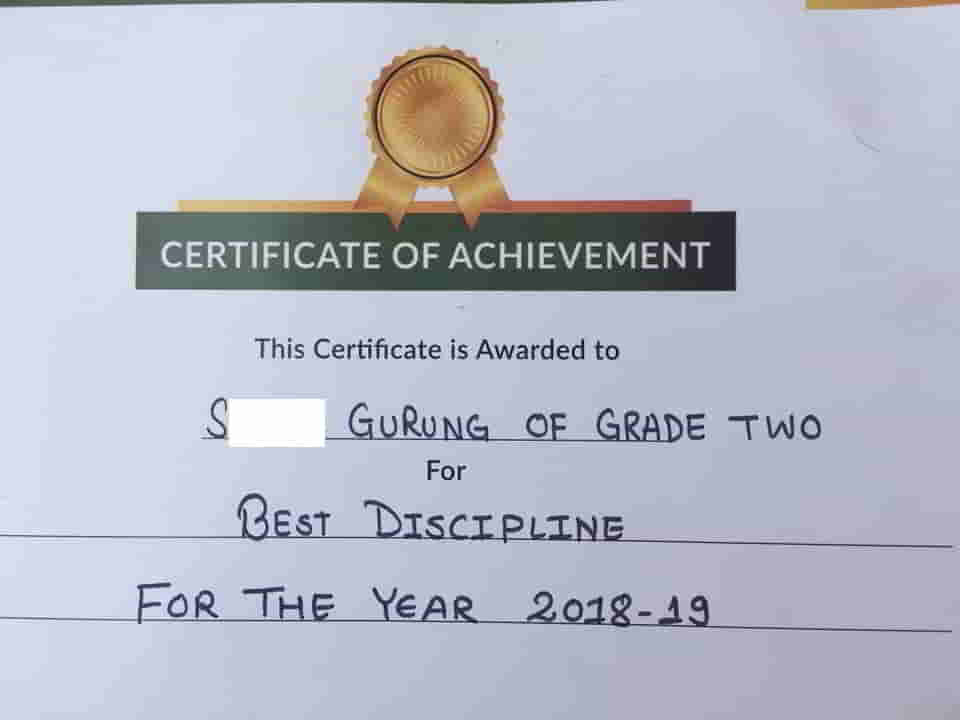
A clear demonstration of change in adults is change in behavior. When sufficient adults change their behaviors, society changes.
Behavioral changes in adults, however, is a three step process and that’s why it does NOT happen readily or easily or quickly. It start with awareness, which then leads to changes in attitude, which in turn leads, finally, to changes in behavior.
What’s interesting about children, however, is that they start with behavior. Only long after the behavior is set does the attitude come, and then, in their teenage years or later, come the awareness. I learned this from observing and working with my little nephew who I have been actively involved in the rearing and education of for most of his life. (How that happened could be a whole blog post on its own, which I’ll publish at a later time.)
The trick in child-rearing, therefore, is to instill in the pre-pubescent child the behaviors you want to see in them as a teenager or young adult.
So, how does one instill a behavior in a child?
Let’s look at the exampe of respectful behavior. What Nepalis prize — unquestioned respect for those older — is unhealthy. Regardless, a majority of us adults in Nepal are set on instilling that in children through fear — fear of verbal, emotional, or physical violence. That, is culturally sanctioned. (Instilling a sense of respect for adult through the fear of violence I find despicable!)
Adult tell children or, worse, order or direct children to show respect! When they are found to be lacking or to have failed, they are chastised or called out, again and again, and in some instances also accompanied by violence. ALL of that is detrimental to the still developing brain of a child — some even traumized. (Human brain is fully developed only by twenty-five or so.)
For that reason a majority of—if not most—Nepali children grow up with fear-based respect for adults. Those who were “taught” respectful behavior through the threat of violence, the overwhelming feelings they will have about interactions with adults will be one of discomfort or dread or even fear. At home, interactions between such a child and adults may be filled with passive aggressive behaviors or even shouting competitions…if there are interactions!
So, once such children become teenagers or young adults themselves, they come to realise how the adults they showed so much respect to—out of fear—didn’t all necessarily deserve it AND, worse, aren’t deserving of their respect anymore. Their opinion of such adults in their lives will be, “They don’t know anything and they don’t care.”
In spite of that, the now old children or young adults might still behave respectfully towards the older adults or feign respect. But they won’t have enough respect to actually start—or have—an honest conversation with them for example, or to seek counsel, forget question them.
As a matter of fact, Nepali adults, generally being highly judgemental of those younger than them — especially of children — don’t miss any opportunity to spout their eminent knowledge and wisdom about life and the world to the young, and dole out prescriptive advice, expecting the latter to just shake their head in agreement AND follow.
Even as a middle-aged man in Nepal the last several years, the way fellow Nepalis of just some years older have had conversations with me I have found to be really really awkward — if you had evesdropped and listened into the way they talked to me, you would have thought I were a child!
So then, how does one PROPERLY impart respectful behavior in babies and toddlers?
By modelling.
How do you model respectful behavior in children?
By listening to them when they talk and by taking them into consideration — their feelings, wishes, desires, ideas, opinions etc.
While listening to them attentively when they speak, provide regular affirmation to and validation for their feelings, their emotions, their thoughts, and their ideas.
Ask for their permission, for example, when you have to — or want to — do something on their behalf, such as visit the school to inquire about the issue the child drew your attention to. Yes, I have done that all the time with my little nephew — from when he was a little toddler of three, attending pre-primary school.
Appologize if you are unable to keep your promise — such as when you were unable to play with them when you said you would, or for not being able to take them for the walk, or trip, you agreed to take them on, or for not showing up to something you agreed to, or for not getting the present you promised. Children remember your promises, even more those that you break!
Appologize for raising your voice or for expressing even the slightest of anger etc. When you appologize, explain why your raised your voice or why you were angry. (Raised voices and anger induces — and leaves — a general feeling of discomfort in the child.)
As small a gesture as each one of them appear to an adult, they leave a huge impression on the little one! The reason is simple. Little things such as those matter to them because they are little. Whether you take them on a ride in your Ferrari or Ford Fiesta or Cinque Cento makes little difference because, in their world, the three don’t have any real discernible difference in worth or value! But whether you do when you promised you would does!
And when you talk — or respond — to them insist gently that they too listen to you, attentively, by facing you and looking into your eyes if need be. If the child is NOT giving you their undivided attention — and they won’t until the behavior has become automatic — don’t let it go. Insist gently, every single time in the beginning, for until when the child hits about five. After that, you can relax a bit. Do NOT demand or order. Forget chastize or punish them physically for NOT doing so!
Anyway, do that enough times for long enough, they will listen to you when you talk, most of the time, because they will have gotten into that habit. That habit sows the seed for understanding and awareness — of the meaning of respect.
All throughout, awareness of what engaging in such a manner means slowly builds and develops in the child’s mind without even them being aware of it, far from being able to articulate it. When the understanding is complete and awareness sets in — sometime in their teenage years or as a young adult — it’ll include the realization that you valued their feeling, ideas, opinions etc., and most importantly that you value them, that they matter.
There is NO other more important and valuable validation a child can get for and about themself than the unequivocal PERSONAL awareness that they matter to the adults in their life.
That awareness will also include the fact that all through life, you the adult listening to them was showing them respect and they listening to you in turn was reciprocating that respect. From then on, not having ever asked or demanded the child show you respect, you won’t have to. The child will naturally because s/he will be completely aware of how to show it and why.
Chilren you have taught respectul behavior through modelling and reinforced again and again for years, will associate good feelings, laughter, fun, happiness etc. with interactions with you. They’ll view engagements with you as interactions, sharing, exploration etc., not something to be feared! They’ll view and understand your sharing your opinions and ideas as guidance and mentorship, not orders, directives, expectations etc. They’ll, therefore, value their time with you and you.
That is NOT to say that the child will NEVER be disrespectful, however. The difference is that a child raised that way will likely NOT display, as a teenager, all the behavioral issues others will — such as being passive aggressive, for example. They won’t show passive aggressive behavior for the simple reason that, not having learned it, they just won’t know how. Children pick up from adults around them, especially parents, more than you know AND without even they themselves being aware of it.
Most habits and behaviors are learned; the exceptions being species-specific instinctual behaviors. If as adults we don’t teach the behaviors we want them to display by displaying them ourselves, a child grows up without knowing how and why, and won’t show them.
To conclude, of course this is but just one example of a behavior and how to instill it in children by modeling. That incidentally is exactly how I have raised my little nephew all of almost 10 years of his life. He does not scream, shout, throw fits or temper tantrums etc. He has NEVER done that since from about a 20-month old baby, for instance. Reason? Not having ever learned how, he simply is unable to.
Addtionally, because I didn’t raise and educate him by “disciplinging” and controlling, he has grown up to be — surprise surprise! — disciplined, even getting the “Best Discipline” certificate in Grade 2 (see image below).

You DEFINITELY should NOT make your interactions with pre-pubsecent children about your authority and ego!
And finally, the challenge, of course, is to figure out how to model ALL the behaviors you want to instill in a child. I haven’t! I am still learning…from my little nephew. I am still figuring out! You can too!
What do you think?
